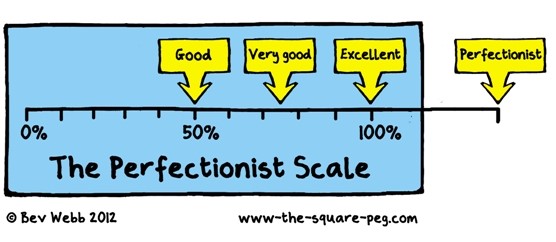10 Ways for Leaders to Combat Perfectionism
By On
Perfectionism Affects Leaders with Excessive Stress
As a leader, you may face frequent demands to meet and surpass the standards set for you, your team, or your business. All too often, this can create a tendency toward perfectionism in some aspect of your leadership. While this quality reflects your high standards and motivation to strive for excellence, there’s a danger when you shift from a quest for the best to a need for perfection in all endeavors.
This can leave you unable to logically analyze what you have to accomplish in relation to time, money, and energy. As a result, you may feel overwhelmed, worried about failure, or even paralyzed. When these feelings occur with frequency, you may start to conclude, “There’s no sense in trying”; or “If I don’t achieve the ideal, I’m a failure.”
Such self-talk creates unnecessary stress. You run the risk of being overcome by self-defeating thoughts laced with pessimism. In essence, you’re always beating yourself up and feeling guilty about something. You never feel good enough.
Perfectionism Defined
Perfectionism is defined as “a disposition to regard anything short of perfection as unacceptable,” according to Merriam-Webster Dictionary 2016, which also gives a medical definition: “the setting of unrealistically demanding goals accompanied by a disposition to regard failure to achieve them as unacceptable and a sign of personal worthlessness.“
Trying to attain the unattainable—given the amount of time or resources available—leaves you spinning your wheels and going over and over what you’ve done. You are caught in a cycle of uncertainty and stress that may lead to procrastination. You might put off a task because your standards are unattainable or unquantifiable. As a result, your productivity lags and your potential is unfulfilled and unrecognized.
Motivations for Perfectionism
Some common causes of perfectionism include the following:
- Fear of begin exposed as inadequate or uninformed.
- Unrealistic expectations: To what degree are your standards aligned with current views of “good enough”? If you are exceedingly bright, your idea of good may be considered extraordinary by others.
- Waiting to begin until you have everything thought out, and being unwilling to take a step-by-step approach.
- Constantly comparing yourself with those who are more experienced.
- Equating the final product as a representation of your worth—rather than an example of your work.
Regardless of the cause of perfectionism, leaders will benefit from pursuing excellence rather than perfection. Remember, when you seek perfection, you make yourself synonymous with the task or activity; when you seek excellence, you work toward quantifiable standards.
10 Tips to Resist Perfectionism
- Visualize a time when you were successful, but not perfect.
- Specify what perfection would be, and then set reasonable standards of excellence. Understand the purpose of the report or project you are leading. Get as much detail as possible. For example, ask, “Is the desired length of the report 10 pages or 20 pages? How much evidence or data is needed, given the decisions that will be made?” Ask for samples of previous reports.
- Remember that constantly seeking perfection inhibits productivity. Counter any negative self-talk, such as “If I don’t do this over and above what others would do, I’ll never keep my position.”
- Move away from “all or none” (polarized thinking). Assess the difficulty and complexity of the task you need to do and how you can achieve “good enough” results.
- Tone down the catastrophic thinking. For example, stop imagining the very worst thing that could happen if a mistake is made or a deadline missed.
- Reach out if you have questions about the process, resources, or output.
- Ask yourself whether the burden needs to be all yours. Whenever possible, delegate or involve others to facilitate timely completion and enhance problem solving, decision making, and innovation.
- Focus on the big picture. Visualize the goals and purpose that you’re working toward.
- For creative endeavors or analytical thinking, schedule quiet time when you are alert. Also schedule start and stop times.
- If you have a pattern of procrastinating or falling behind, or of feeling overstressed and fatigued, discuss your perfectionist tendencies with a trusted friend or mental health professional.
In her TED talk, Charley Haversat, a former professional athlete, feels that perfectionism holds us back in both our personal and professional lives. Consider her message about the dangers of perfectionism in the workplace and the world. How does it in relate to your current work and life?
Finally, remember that the ancient Greek and Roman gods were considered models of perfection in their day—but even those gods were flawed. In a leadership position, it’s important not to jump to hard and fast ideas of perfection. Instead pursue excellence as a process of thinking, doing, evaluating, and revising according to reasonable standards, and you will be healthy and productive.
*******************************
Dr. Markel Offers Value-Driven Keynotes and Breakouts.
Download Dr. Markel’s Speaker One Sheet: GeriMarkelCorporateOneSheet-Print
Book Dr. Markel to Speak at Your Next Event? Connect Today!
